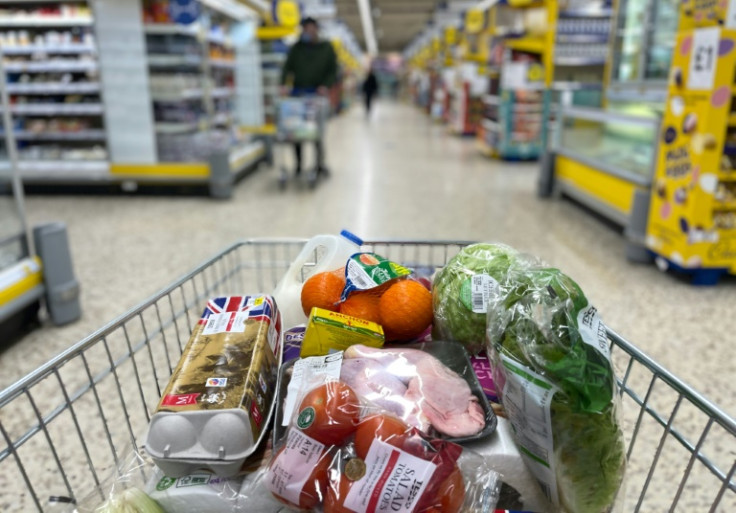Is the soaring cost of living rooted in a deeper "cost of adaptation" crisis?
Climate and economic experts are pointing out that the systemic global and local problems behind sticky food inflation need more than just monetary approaches.

Data released by the Office of National Statistics (ONS) shows that food inflation eased slightly in May to 18.4 per cent. The corresponding figure for April was 19.1 per cent.
The small change will be little comfort to struggling households as the ONS noted that the March and April data for the category – ie food and non-alcoholic beverages – was the highest recorded for 45 years.
The largest downward contribution between April and May was from milk, cheese and eggs, while the price of fish rose 16.6 per cent, up from 14.2 per cent in the year to April 2023.
Ed Conway, economics and data editor at SkyNews took to Twitter this morning to discuss the transmission mechanism behind this evidently sticky food inflation – and worryingly, why those factors may be embedded in a way that will not be responsive to monetary policy decisions alone.
Specifically, to understand why Britons are set to pay not only the highest interest rates in the G7 but will also have to put up with stubborn food inflation, he asked the public to view the issue by thinking about cucumbers – yes, cucumbers.
For not only is the cucumber one of Britain's great vegetable stables, the iconic filling in sandwiches at tea parties up and down the land, its story also tells you rather a lot about the economic pickle we're in right now (pun intended). pic.twitter.com/ekrxO48vD6
— Ed Conway (@EdConwaySky) June 21, 2023
The cucumber has been sold at artificially depressed prices by supermarkets in a price war, for about the last decade. It has shot up from 50 pence to 83 pence in the last year or so.
However, now it seems the means of production are coming under strain – specifically, the technology used to grow increasing proportions of our food, including cucumbers, aubergines, tomatoes, salad leaves and so on.
"Controlled environment agriculture" refers to greenhouses where plants are grown hydroponically in a tightly controlled environment. Humidity and temperature are kept at closely monitored, ideal levels.
Hydroponics refers to the process of growing plants without soil, directly in a nutrient solution.
The UK depends on large amounts of locally grown hydroponic produce as well as a large amount imported from abroad, mainly The Netherlands – which is host to huge hydroponic farms exporting to all of Europe.
The Guardian reported last year that Britain's hydroponic farms are shutting down due to the strain of Brexit, and increasing energy costs.
The farms are extremely energy-intensive enterprises. Among other things, energy is needed for artificial light to aid growth during night-time hours. They are powered by fossil fuels, a situation not helped by the Ukraine invasion.
Growers in the Lea Valley, Britain's "cucumber capital" have been closing down their farms due to rising energy costs and a shortage of labour.
The cheap labour needed to pick produce at hydroponic farms is no longer available post-Brexit.
Local and regional factors aside, Britain is hardly immune to global pressures. Leo Barasi from the European Climate Foundation took to Twitter yesterday to cite many sobering examples of climate-induced disruption to food production worldwide that is driving high inflation in many parts of the world, including Britain.
According to Barasi, the top inflating food item in Britain is sugar. Its price has shot up by an eye-watering 50 per cent. One factor he cites is increasing rains in Maharashtra, India, that have depressed production and hit exports, including to Britain.
The second-top riser is olive oil. Prices have ballooned by 47 per cent – largely due to a drought in the Mediterranean, which has slashed production, most notably in Spain.
Barasi also cites pasta prices, which have gone up by 28 per cent in the last year, and 40 per cent in the last two years. This has been due to a 2021 drought in Canada, which is a major producer of durum wheat.
Whilst durum wheat prices are starting to fall, and pasta is expected to follow, it is sobering that the impact has lasted two years.
The Energy and Climate Intelligence Unit, a think tank, found last year that British households paid on average 407 pounds more for food in 2022 than the previous year, due to climate change impacting global food production and the rising world prices for oil, gas and fertilisers.
The factors contributing to those rises have only worsened in 2023. The Energy and Climate Intelligence Unit has warned that UK food security could be impacted – signs of which are already appearing – unless global action on climate change occurs and agriculture reduces its reliance on oil and gas.
Whilst the Bank of England tries to tackle stubborn inflation, there is broad agreement that Rishi Sunak's government must take a more holistic look at the factors impacting UK food security in the longer term.
Even as the term "cost of living crisis" describes the very challenging economic circumstances faced by countless Britons, it seems it is not capturing the true depth of the "cost of adaptation" crisis the country is facing.
© Copyright IBTimes 2025. All rights reserved.






















